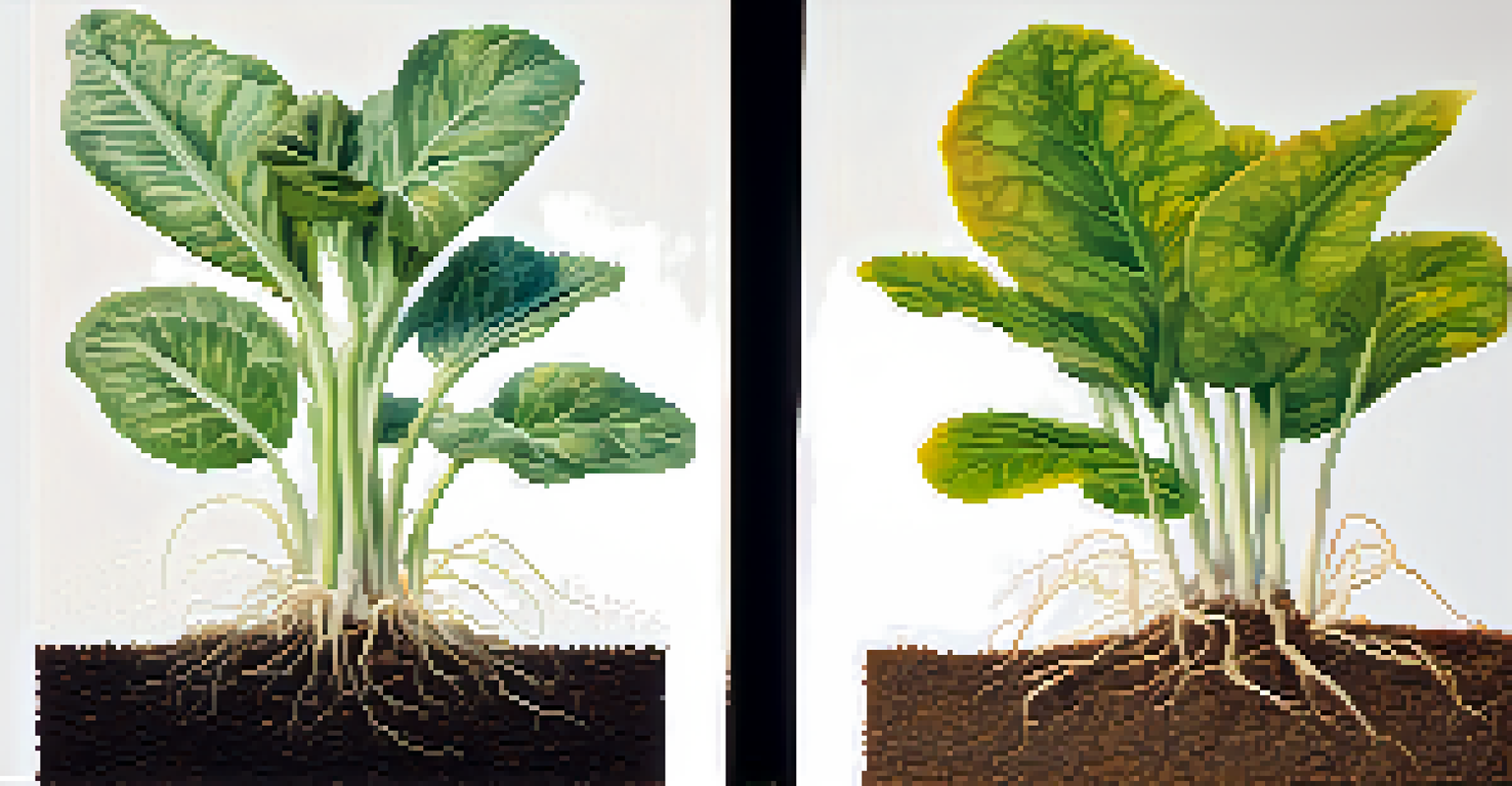How Mycorrhizal Fungi Enhance Plant Nutrition and Growth

Understanding Mycorrhizal Fungi and Their Role
Mycorrhizal fungi are a fascinating group of organisms that form symbiotic relationships with plant roots. These tiny fungi extend the root system's reach, allowing plants to access nutrients and water that they otherwise couldn't. Think of mycorrhizal fungi as helpful partners, working tirelessly beneath the soil to support plant growth.
The soil is the great connector of our lives, the source and destination of all. Food, fiber, shelter, and ecosystem services—all essential to our survival and wellbeing—derive from the soil.
There are two main types of mycorrhizal fungi: arbuscular mycorrhizal (AM) fungi and ectomycorrhizal fungi. AM fungi penetrate plant root cells, while ectomycorrhizal fungi wrap around the roots, forming a protective layer. Both types provide critical services to plants, enabling them to thrive in various environments.
This relationship is beneficial for both parties: the fungi receive carbohydrates from the plants, while the plants gain enhanced access to essential nutrients like phosphorus and nitrogen. This partnership is a perfect example of nature's interconnectedness, showcasing how different organisms can work together for mutual benefit.
Nutrient Uptake: A Fungal Advantage
One of the most significant benefits mycorrhizal fungi provide is improved nutrient uptake. They help plants absorb vital minerals such as phosphorus, potassium, and micronutrients, which are crucial for growth and development. Without fungi, many plants would struggle to access these nutrients in the soil.

These fungi create a vast network of hyphae—thin, thread-like structures—that expand the root system's surface area dramatically. This extension allows plants to explore a larger volume of soil, increasing their chances of finding nutrients. It's like having a personal shopper for nutrients, ensuring that plants get exactly what they need.
Mycorrhizal Fungi Boost Nutrient Access
These fungi extend plant root systems, enhancing nutrient and water absorption crucial for growth.
Moreover, mycorrhizal fungi can solubilize nutrients, making them more available to plants. This process transforms otherwise inaccessible minerals into forms that plants can readily absorb, further enhancing their nutrition and overall health. It's a win-win situation that showcases the power of collaboration in nature.
Enhancing Plant Resilience with Fungi
Mycorrhizal fungi not only boost nutrient uptake but also enhance plant resilience against environmental stresses. For example, plants associated with these fungi tend to be more drought-resistant, as the fungi improve water absorption. This is particularly vital in times of water scarcity, where every drop counts.
Nature does not hurry, yet everything is accomplished.
Additionally, the presence of mycorrhizal fungi can help plants fend off diseases. The protective layer formed by ectomycorrhizal fungi can act as a barrier against pathogens, reducing the likelihood of infection. It's as if the fungi provide a shield, allowing plants to focus energy on growth rather than fighting off threats.
This resilience is crucial for agricultural practices, especially as climate change poses new challenges. By incorporating mycorrhizal fungi into farming methods, growers can enhance crop yields and improve sustainability, all while minimizing reliance on chemical fertilizers and pesticides.
Mycorrhizal Fungi and Soil Health
The benefits of mycorrhizal fungi extend beyond individual plants; they also play a significant role in overall soil health. These fungi contribute to soil structure by forming aggregates, which improve aeration and water retention. Healthy soil is the foundation of thriving ecosystems, and fungi are key players in maintaining this balance.
Moreover, mycorrhizal fungi can help sequester carbon in the soil, acting as a natural solution to combat climate change. As they break down organic matter, they store carbon, effectively reducing greenhouse gases in the atmosphere. This ecological service showcases the importance of preserving fungal networks in our soils.
Fungi Enhance Plant Resilience
Mycorrhizal fungi help plants withstand environmental stresses, improving drought resistance and disease protection.
Incorporating practices that promote mycorrhizal fungi in soil management can lead to healthier crops and ecosystems. Whether through organic farming or reforestation efforts, fostering these fungal relationships is essential for sustainable land use and environmental stewardship.
The Impact on Crop Yields
Farmers and gardeners alike have discovered that mycorrhizal fungi can significantly enhance crop yields. Research has shown that crops grown with mycorrhizal associations often outperform those without, leading to healthier, more productive plants. This effect can be especially pronounced in nutrient-poor soils.
The increased nutrient absorption facilitated by mycorrhizal fungi allows plants to reach their full genetic potential. This means greater fruit and vegetable production, which can contribute to food security. Imagine a world where farmers can grow more food with less chemical input—mycorrhizal fungi can help make that a reality.
Additionally, the resilience that fungi provide against pests and diseases reduces the need for chemical treatments. This not only benefits the environment but also results in healthier food for consumers. By tapping into nature's own solutions, we can create a more sustainable agricultural system.
How to Encourage Mycorrhizal Fungi in Your Garden
If you're interested in harnessing the power of mycorrhizal fungi, there are several simple steps you can take in your garden. Start by choosing native plants, as they often have established relationships with local mycorrhizal species. This can create a thriving underground network that supports plant health.
Avoid using chemical fertilizers and pesticides, as they can harm beneficial fungi. Instead, consider organic fertilizers that promote a healthy soil ecosystem. Composting is another excellent way to enrich your soil, providing organic matter that encourages mycorrhizal growth.
Promoting Soil Health and Sustainability
Mycorrhizal fungi contribute to soil structure and carbon sequestration, playing a vital role in maintaining healthy ecosystems.
Lastly, consider inoculating your soil with mycorrhizal fungi through commercially available products. These inoculants can help jump-start the process, giving your plants the best possible start. With a little effort, you can cultivate a flourishing garden that benefits from the incredible partnership between plants and fungi.
The Future of Mycorrhizal Research
Research on mycorrhizal fungi is continually evolving, revealing new insights into their complex relationships with plants. Scientists are exploring how these fungi can be used in agriculture, landscaping, and ecological restoration. The potential applications are vast, and the implications for sustainability are exciting.
Future studies are also focusing on the genetic diversity of mycorrhizal fungi and how different species can affect plant health. Understanding these relationships better can lead to more targeted and effective agricultural practices. As we learn more about these fungi, we can refine our approach to farming and gardening.

Ultimately, mycorrhizal fungi hold great promise for improving food security and environmental health. By investing in research and promoting practices that support these crucial organisms, we can cultivate a more sustainable future for generations to come.